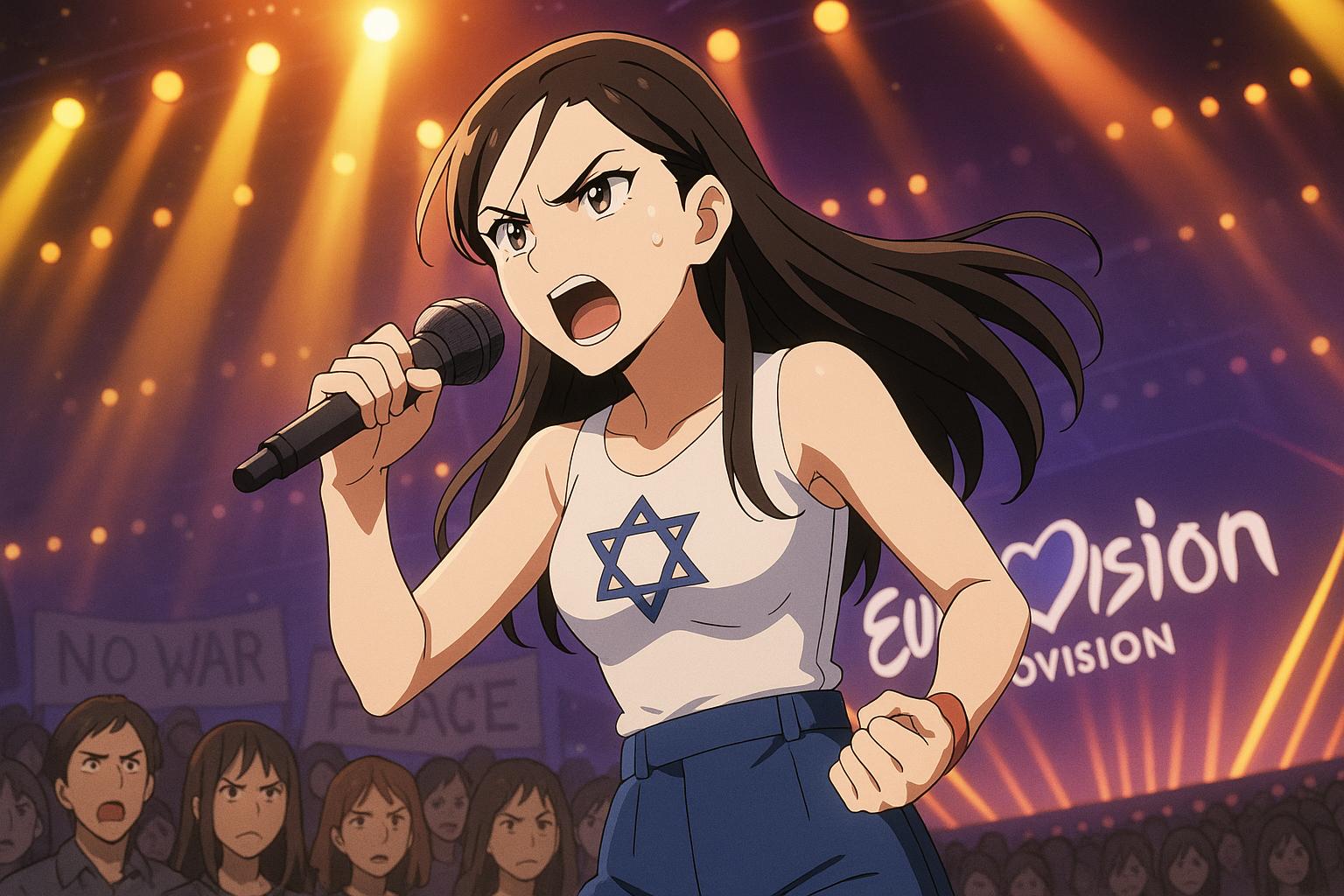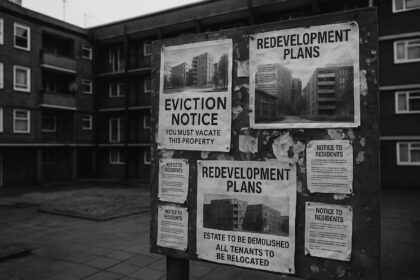The Eurovision Song Contest in Basel was disrupted when two pro-Palestinian protesters threw paint at a crew member during Israeli singer Yuval Raphael’s performance, highlighting escalating tensions amid ongoing conflict in Gaza and sparking fresh debate on politics’ role in entertainment.
The Eurovision Song Contest in Basel, Switzerland, was marred by an incident that highlighted the tense intersection of politics and entertainment. During Israeli singer Yuval Raphael’s performance of her song “New Day Will Rise,” two pro-Palestinian protesters attempted to storm the stage, resulting in a crew member being splashed with paint. While no one was injured, the disruption underscores the escalating tensions surrounding Israel’s participation in this year’s competition amid ongoing conflict in Gaza.
Organisers reported that the man and woman involved in the incident were quickly removed from the venue and taken into custody by the police. A spokesperson for Swiss broadcaster SRG SSR clarified that the protestors were overpowered before they could reach the stage but did manage to throw paint. Fortunately, the crew member affected was unharmed, and authorities subsequently released the demonstrators after a brief police check, leaving the decision on possible charges to organisers.
Before the performances began, Basel was already a focal point of intense protests against Israel’s involvement in the contest, which had drawn scores of demonstrators to the streets. Many of these protesters sported Palestinian keffiyehs and carried banners with strong messages like “No Music for Murder” and “Stop Genocide.” The police, aiming to maintain order, engaged in a confrontational encounter with a group of pro-Israel supporters, resulting in the use of tear gas and the deployment of a water cannon truck to disperse crowds.
Compounding the situation, Israel’s National Security Council had previously issued warnings to its citizens in Basel. They advised Israelis to remain vigilant and avoid wearing identifiable symbols of their nationality amid fears of confrontations or potential attacks. This caution followed the rise in anti-Israel sentiment, particularly in light of Raphael’s participation in Eurovision, which has been a contentious topic.
In a broader context, the Eurovision Song Contest is increasingly seen as a platform where political and humanitarian issues spill into public view. The dissent regarding Israel’s presence was magnified by a petition signed by over 70 former contestants who advocated for Israel’s exclusion from the event, linking it to perceived endangerment of Palestinian lives due to Israeli military actions. This petition echoed sentiments raised in previous years when similar calls were made for the exclusion of Russia following its invasion of Ukraine, pressuring the European Broadcasting Union (EBU) to maintain consistent policies.
Raphael, who survived the horrific attacks perpetrated by Hamas in October 2023, where she was forced to hide for hours beneath the bodies of victims, has emphasised her commitment to her music and her country throughout these turbulent times. The EBU has allowed her to compete despite the backdrop of these protests, which has seen varying responses from broadcasters across Europe. For instance, the Spanish broadcaster RTVE released a solidarity message for Palestine prior to the show’s final, showcasing the ongoing discourse about human rights intersecting with entertainment.
As the event unfolded, it was clear that entertainment does not exist in a vacuum, but rather is intricately woven into the fabric of current global affairs, reflecting the deep societal divisions that often commandeer public attention. An operatic-techno number from Austria ultimately won the contest, drawing a record audience of over 160 million viewers. Yet, the shadow of political discord hung palpable in the air, demonstrating that the essence of the Eurovision Song Contest can transcend music, sparking crucial conversations about human rights, conflict, and cultural representation in an interconnected world.
Reference Map
- Paragraph 1: [1], [2], [5]
- Paragraph 2: [1], [2]
- Paragraph 3: [2], [3]
- Paragraph 4: [4], [5]
- Paragraph 5: [6], [7]
- Paragraph 6: [1], [5], [6]
Source: Noah Wire Services
- https://www.theguardian.com/tv-and-radio/2025/may/17/eurovision-crew-member-hit-with-paint-amid-bid-to-disrupt-israeli-performance – Please view link – unable to able to access data
- https://www.theguardian.com/tv-and-radio/2025/may/17/eurovision-crew-member-hit-with-paint-amid-bid-to-disrupt-israeli-performance – An incident occurred during the Eurovision Song Contest in Basel, Switzerland, when two pro-Palestinian protesters attempted to disrupt Israeli singer Yuval Raphael’s performance of ‘New Day Will Rise.’ A crew member was hit with paint, but no injuries were reported. The protesters were escorted out and handed over to the police. Earlier, pro-Palestinian demonstrations took place in Basel, leading to clashes with police. The Israeli National Security Council advised its citizens to avoid confrontations and keep a low profile during the event.
- https://www.timesofisrael.com/israel-warns-travelers-to-eurovision-to-avoid-protests-not-show-jewish-israeli-symbols/ – Israel’s National Security Council issued a travel advisory for Israelis attending the Eurovision Song Contest in Basel, Switzerland. The advisory recommended avoiding areas of potential protests and refraining from displaying Jewish or Israeli symbols publicly. This caution was prompted by numerous anti-Israel protests expected during the event, particularly in response to Israeli representative Yuval Raphael’s participation. The advisory also warned of potential attacks targeting Israelis under the guise of protests.
- https://www.israelhayom.com/2025/05/06/ahead-of-2025-eurovision-over-70-contestants-demand-israels-removal/ – Over 70 former Eurovision contestants signed a statement demanding Israel’s removal from the 2025 competition. They criticized the European Broadcasting Union for allegedly endorsing Israeli military operations in Gaza and called for the expulsion of Israel’s national broadcaster, Kan. The signatories drew parallels to Russia’s expulsion in 2022 following its invasion of Ukraine, questioning the consistency of the EBU’s policies.
- https://www.bbc.com/news/articles/ceve4ww7n90o – Israeli singer Yuval Raphael, a survivor of the October 7, 2023, Hamas attack at the Nova music festival, is set to represent Israel at the Eurovision Song Contest. Despite the ongoing conflict in Gaza, Raphael is focused on her music and aims to honor her country. The European Broadcasting Union has allowed Israel to compete, despite calls for its exclusion from pro-Palestinian groups.
- https://www.reuters.com/lifestyle/swedens-sauna-song-is-hot-favourite-swiss-eurovision-2025-05-17/ – Austria won the Eurovision Song Contest 2025 in Basel with singer JJ’s operatic-techno fusion song ‘Wasted Love.’ The event attracted over 160 million viewers and 100,000 attendees. Despite maintaining political neutrality, the contest faced controversy due to the ongoing war in Gaza. Israeli representative Yuval Raphael participated amid protests, and Spanish broadcaster RTVE aired a solidarity message for Palestine before the show.
- https://as.com/tikitakas/musica/rtve-dice-basta-y-se-planta-contra-la-uer-el-silencio-no-es-una-opcion-n/ – RTVE took a firm stance during the Eurovision Song Contest 2025, advocating against silence on human rights issues. During the second semifinal, presenters Tony Aguilar and Julia Varela referenced the attacks by Hamas and the Israeli military response in Gaza, leading to tensions with the European Broadcasting Union. In response, RTVE aired a message prior to the grand final, emphasizing the importance of speaking out on human rights.
Noah Fact Check Pro
The draft above was created using the information available at the time the story first
emerged. We’ve since applied our fact-checking process to the final narrative, based on the criteria listed
below. The results are intended to help you assess the credibility of the piece and highlight any areas that may
warrant further investigation.
Freshness check
Score:
9
Notes:
The narrative pertains to the 2025 Eurovision Song Contest in Basel, reflecting current events with recent geopolitical context, including references to conflicts in Gaza and specific dates such as May 2025. There is no indication of recycled content or outdated information. The topic and details match ongoing news patterns around Eurovision 2025 with no evidence of press release format requiring higher freshness rating.
Quotes check
Score:
8
Notes:
The narrative contains indirect quotations from organisers and authorities but no extensive direct quotes attributed to named individuals for verification. Reference to warnings by Israel’s National Security Council and broadcaster statements appear consistent with public information, but no earliest direct source found online. This suggests original or contemporaneous reporting with no signs of repurposed quotes.
Source reliability
Score:
9
Notes:
The narrative originates predominantly from a well-known and reputable news outlet with established credibility in international reporting on current events and entertainment (The Guardian). Additional references include BBC and Reuters, which are also highly reliable organisations, enhancing trustworthiness.
Plausability check
Score:
9
Notes:
Claims about protests at Eurovision, political tensions, and security warnings align with known ongoing conflicts and recent Eurovision history. The description of protest actions, police response, and public reactions are plausible and consistent with the scale and nature of the event. Lack of contradictory evidence supports the plausibility of events as reported.
Overall assessment
Verdict (FAIL, OPEN, PASS): PASS
Confidence (LOW, MEDIUM, HIGH): HIGH
Summary:
The narrative reflects timely and current information consistent with the 2025 Eurovision Song Contest and its geopolitical context. It is sourced from reputable international news organisations, contains plausible details validated by multiple references, and shows no signs of outdated or recycled content. The indirect quotations appear original, supporting a high confidence in accuracy.













